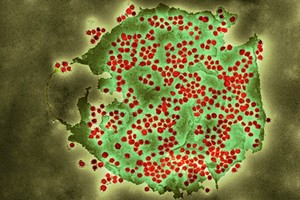People with a positive lateral flow test no longer required to take confirmatory PCR test
From 11 January, most people with a positive lateral flow test do not need to take a confirmatory polymerase chain reaction (PCR) test to confirm they have COVID-19.

If you test positive on a lateral flow device (LFD) test you should self-isolate immediately and register your result on GOV.UK so that NHS Test and Trace can trace your contacts.
The temporary measure was announced last week while coronavirus (COVID-19) rates remain high across the UK. During periods of high prevalence, it is very likely that a positive LFD test means you have COVID-19.
Record numbers of free LFD tests have been distributed over recent weeks and capacity continues to increase.
Around 1.7 billion LFD tests have been distributed across the UK since the start of the COVID-19 pandemic, with maximum home delivery capacity now 7 million LFD tests every day.
Health and Social Care Secretary Sajid Javid said:
Our world-leading testing system is protecting millions of people from COVID-19.
Since the emergence of the Omicron variant, the public has been playing their part with hundreds of thousands coming forward to get tested and jabbed every day.
Today’s change will help ensure those who need PCR tests can access them, and I encourage everyone to keep using our highly accurate lateral flow tests regularly and to Get Boosted Now.
Chief Executive of the UK Health Security Agency (UKHSA), Dr Jenny Harries, said:
This is a tried and tested approach. With COVID-19 cases high, we can confidently say lateral flow tests can be used to indicate COVID-19 without the need for PCR confirmation.
If you test positive on an LFD, you should self-isolate immediately and register your result to allow contact tracing to take place.
It also remains really important that anyone experiencing COVID-19 symptoms self-isolates and gets a PCR test via GOV.UK, or by phoning 119.
I’m really grateful to the public and all of our critical workers who continue to test regularly and self-isolate when necessary, along with other practical and important behaviours to limit transmission of the virus, as this is the most effective way of stopping the spread of infection and keeping our friends, families and communities safe.
There are some exceptions to this approach and certain groups will still require a confirmatory PCR following a positive LFD result:
-
People who wish to claim the Test and Trace Support Payment. To claim the Test and Trace Support Payment, you must have tested positive for COVID-19 following a PCR test or an assisted LFD test.
-
People who have received an email or letter from the NHS because of a health condition that means they may be suitable for new COVID-19 treatments. This applies when they develop any COVID-19 symptoms, and they should use the PCR test kit that was sent to them in the post for this purpose. If they have not received a PCR test kit they can arrange to have a PCR test.
-
People who are taking LFD tests as part of research or surveillance programmes, and the programme asks them to take a follow-up PCR test.
-
People who have a positive day 2 LFD test result after they arrive in England.
LFD tests are to be used by people without COVID-19 symptoms. Anyone who has one of the core symptoms of COVID-19 – a high temperature, a new, continuous cough or a loss or change to your sense of smell or taste – should self-isolate and take a PCR test. They must self-isolate if they get a positive test result, even if they have had a recent negative lateral flow test – these rules have not changed.
In line with the reduced self-isolation approach announced on 22 December, anyone who tests positive can leave self-isolation 7 days after the date of their initial positive test if they receive 2 negative LFD results, 24 hours apart, on days 6 and 7.
The temporary measure to remove confirmatory PCR tests has been introduced before, between January and March 2021.